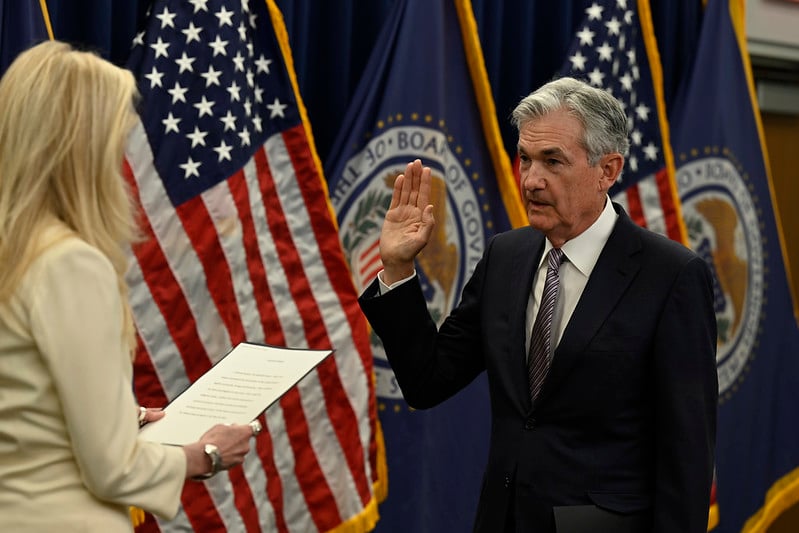Jerome Powell on Monday was sworn in for his second term as Chairman of the Federal Reserve Board of Governors.
In November 2021, US President Joe Biden re-nominated Powell, which was voted on in the Senate on May 12. His new term as Chairman expires on May 15, 2026 and as a member of the Board of Directors on January 31, 2028.
Many economists blame Powell for miscalculating the course of inflation and its repercussions last year when he insisted that high inflation rates are temporary and do not require immediate measures to contain them. But inflation has reached levels not seen in the United States for 40 years.
In debate today is that the high inflation is not only in the United States but in all countries of the world due to the measures taken during the Corona pandemic, disruptions in supply chains, and then the Russian-Ukrainian war. But this inflation was much worse in the US, due in large part to the excessive spending bills that were passed in early 2021 via the US bailout. As a reminder, Powell has been a consistent fan of the $2 trillion bill, which many have warned could cause inflation – especially as the Federal Reserve announced that it would continue its hyper-accommodative monetary policy with no end in sight.
Even when Powell acknowledged at the end of 2021 that there was a danger of inflation, he did little about it, in the sense that the Federal Reserve did not immediately approve a moratorium on treasury bonds, whose portfolio had ballooned significantly until last March. If he had done so since the beginning of the year, this portfolio would have shrunk and helped, to some extent, measures to contain inflation.
The announcement of small increases in interest rates also did not help in curbing the path of inflation until the Federal Reserve, in its last session, was forced to announce a half percentage point increase at this month’s meeting, and “will continue to push” towards tightening monetary policy until it becomes clear that Inflation is declining to a healthy level, according to Powell himself.
Soft landing
And from the description of “temporary inflation” to “a soft landing”, it was an expression that Powell gave when he voiced his confidence in the ability of the Federal Reserve to ensure a “soft landing” of the economy that allows “inflation to be controlled without causing deflation.” By this he meant that demand would come closer to supply, which in turn could “lower wages, reduce inflation without having to slow the economy and have a recession and actually increase unemployment.”
The question here is how will the Federal Reserve be able to achieve its goal of reaching the target level of 2 percent (today it has exceeded 8 percent) by reducing activity in the labor market only?
JP Morgan: Only 33% of the chances of a soft landing
JPMorgan CEO Jamie Dimon said the Fed’s chances of a “soft landing” for the US economy – where inflation is curbed without inducing a recession – are only 33%.
“If they can, they will try to slow down the economy enough so that the 8% starts dropping over time,” Damon added in his interview with Bloomberg. “I wish them the best. We are a bit late, but remember, two years ago, we had 15% unemployment. And no vaccine.” Thus, under the chairman’s watch, inflation accelerated.
“I don’t think you can have a completely moderate decline in the economy at this point, where inflation is going down but unemployment is not rising, so we either have a weak economy or we suffer a recession,” said Ethan Harris, head of global economics research at Bank of America. .
Perhaps the most prominent critic of the Federal Reserve, Mohamed El-Erian, chief economic adviser at Allianz and president of Queen’s College in Cambridge, England, has been calling for central bank officials to raise interest rates and combat rising inflation for months, arguing that the United States is in the midst of a “cost of living crisis”.
El-Erian believes that stagflation is inevitable. “We’ve seen growth come down and inflation remains high, the Fed is finally catching up with developments on the ground, but it still has some way to go.”
He also believes that the current rise in stagflation could have been avoided if the Federal Reserve had acted faster. He expects the Federal Reserve not to be able to make a soft landing while stressing that a recession can still be avoided.








